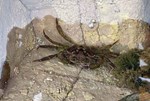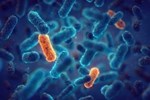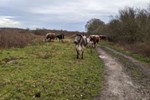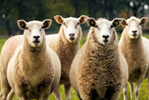Dr Louise Whatford
Department: Pathobiology & Population Sciences
Campus: Hawkshead
Research Groups: Animal Welfare Science and Ethics, Sustainable Food Systems
Research Centres: RVC Animal Welfare Science and Ethics, Veterinary Epidemiology, Economics and Public Health
Louise is Lecturer in One Welfare in the Animal Welfare Science and Ethics and, Veterinary Epidemiology, Economics and Public Health Groups. She is passionate about researching the interconnections between human and non-human welfare and the environment, linking this with One Health and One Welfare and More than Human approaches. And ensuring welfare (particularly non-human animal welfare) is being included in the larger more holistic questions using food systems and systems thinking approaches.
Louise graduated from the University of Bristol with a BSc in Animal Behaviour and Welfare. In 2019 she completed a PhD in epidemiology and microbiology that was interested in increasing our understanding of mastitis in sheep and developing strategies for its control. This has led to her interest in agriculture, livestock health and welfare and its links to sustainble food production, and interdisciplinary approaches to tackle questions.
Louise is interested in the interconnections and nexus between non-human animals, people and the environment. She specialises in using systems thinking and interdisciplinary multi/interspecies approaches to tackle and research the complex questions around sustainable and welfare-conscious livestock and fish food systems. Currently her research explores inter- and transdisciplinary methods to understand more about sustainability, particularly, in the beef and sheep food and marketing systems in Great Britain. With a particular interest in exploring how to better integrate non-human animal welfare, ethical considerations, and the One Welfare concept into One Health and the wider, more holistic and wicked problems we face today.
Esievo, E.M., Whatford, L., Espinosa, S.N., Awulu, O.A., Ahmed, A.N., Murray, K.A. and Ali, Z., 2025. One Health conceptualization of sustainable diets looking at low-and middle-income settings: a systematic literature review. Frontiers in Sustainable Food Systems, 9, p.1567245. https://doi.org/10.3389/fsufs.2025.1567245
Pateman, R.M., Bennett, J., Hilton, A.C., Romeo-Melody, I., Rosenfeld, A., Routledge, S.J., Rymer, C., Swift, B.M., Way, L., Whatford, L. and Wilkinson, N.C., 2024. Opportunities for microbiology citizen science: lessons learnt from three pilot projects. Access Microbiology, pp.000899-v1. https://doi.org/10.1099/acmi.0.000899.v3
Bennani, H., Whatford, L., Myers, J., Mays, N., Glover, R. and Häsler, B., 2024. Progress and Challenges: Implementation of the UK Antimicrobial Resistance National Action Plan 2019–2024 within the Beef Cattle Sub-Sector. Antibiotics, 13(9), p.839. https://doi.org/10.3390/antibiotics13090839
Myers J, Whatford L, Qi, A, Cooke R, Payne-Gifford S, Tak M, van Winden S, Barling D and Hasler B. 2024. Research brief 3 - Exploring opportunities and risks of the Environmental Land Management schemes (ELMs)
Payne-Gifford S, Myers J, Whatford L, Tak M, van Winden S, Qi A, Hasler B and Barling D. 2024. Research brief 2 - Exploring opportunities and risks of the Animal Health and Welfare Pathway (AHWP). 2024. 10.6084/m9.figshare.26038225.v1.
Whatford L, Payne-Gifford S, Myers J, Tak M, van Winden S, Qi A, Barling D and Hasler B. 2024. Research brief 3 - Exploring opportunities and risks of the Environmental Land Management schemes (ELMs). 10.6084/m9.figshare.26038228.v1
Simbi B, Pink RC, Whatford L, Lawson C. Particles in Raw Sheep Milk Can Modulate the Inflammatory Response in THP-1, a Human Monocyte Cell Line, In Vitro. Dairy. 2024; 5(1):161-172. https://doi.org/10.3390/dairy5010013
Whatford L, Chivers BD, Rowe M, Blackie N. A Survey of the Current Farming Practices and Perceptions on Adopting Orphan Lambs in the United Kingdom: How Do “Ewe” Do It? Ruminants. 2023; 3(4):468-482. https://doi.org/10.3390/ruminants3040038
Qi A, Whatford L, Payne-Gifford S, Cooke R, Van Winden S, Häsler B, Barling D. Can 100% Pasture-Based Livestock Farming Produce Enough Ruminant Meat to Meet the Current Consumption Demand in the UK? Grasses. 2023; 2(3):185-206. https://doi.org/10.3390/grasses2030015
Roshania, R.P., Yates, J., McIntyre, L., Chancellor, T., Fivian, E., Hill, M., Isoto, R., Marinda, P., Narayanan, S., Whatford, L. and Zotor, F., 2023. Assessing needs for interdisciplinarity in agriculture, nutrition, and health education. Global Food Security, 37, p.100691. https://doi.org/10.1016/j.gfs.2023.100691
Lanzoni, L., Whatford, L., Atzori, A., Chincarini, M., Giammarco, M., Fusaro, I. and Vignola, G., 2023. The challenge to integrate animal welfare indicators into the Life Cycle Assessment. animal, p.100794. https://doi.org/10.1016/j.animal.2023.100794
Häsler, B., Queenan, K., Alarcon, P., Raj, E. and Whatford, L., 2023. Where One Health Meets Food Systems Teaching and Learning: Expanding Skillsets for Food System Transformation. One Health Cases, (2023), p.ohcs20230010. https://doi.org/10.1079/onehealthcases.2023.0010
Whatford, L., van Winden, S. and Häsler, B., 2022. A systematic literature review on the economic impact of endemic disease in UK sheep and cattle using a One Health conceptualisation. Preventive Veterinary Medicine, p.105756. https://doi.org/10.1016/j.prevetmed.2022.105756
Fletcher, K.A., Limon, G., Whatford, L.J., Grist, A., Knowles, T.G. and Gibson, T.J., 2022. A systematic review of equid welfare at slaughter. Livestock Science, 263, p.104988. https://doi.org/10.1016/j.livsci.2022.104988
Payne-Gifford, S., Whatford, L., Tak, M., Van Winden, S. and Barling, D., 2022. Conceptualising Disruptions in British Beef and Sheep Supply Chains during the COVID-19 Crisis. Sustainability, 14(3), p.1201. https://doi.org/10.3390/su14031201
Pope, H., De Frece, A., Wells, R., Borrelli, R., Ajates, R., Arnall, A., Blake, L.J., Dadios, N., Hasnain, S., Ingram, J., Reed, K., Sykes, R., Whatford, L., White, R., Collier, R. and Häsler, B. 2021. Developing a functional food systems literacy for interdisciplinary dynamic learning networks. Frontiers in Sustainable Food Systems, 5, p.747627. https://doi.org/10.3389/fsufs.2021.747627
Arnold J, Whatford L, Gabain I, Tak M, Van Winden S, Barling D, & Haesler, B. 2021. Exploring the barriers and incentives towards effective surveillance for antimicrobial and anthelmintic usage (AMHU) in beef cattle and sheep in Great Britain. RVC Research Online: https://doi.org/10.34840/3r19-fc05
Arnold J, Whatford L, Gabain I, Tak M, Van Winden S, Barling D, & Haesler, B. 2021. AMHU Surveillance GB Beef Cattle And Sheep Research Brief 2021. RVC Research Online: https://doi.org/10.34840/AX5J-EJ54
Chapot, L#., Whatford, L#., Compston, P., Tak, M., Cuevas, S., Garza, M., Bennani, H., Bin Aslam, H., Hennessey, M., Limon, G. and Queenan, K., 2021. A global media analysis of the impact of the covid-19 pandemic on chicken meat food systems: Key vulnerabilities and opportunities for building resilience. Sustainability, 13(16), p.9435. https://doi.org/10.3390/su13169435 # authors have equal contributions
Hennessey, M., Whatford, L., Payne-Gifford, S., Johnson, K.F., Van Winden, S., Barling, D. and Häsler, B., 2020. Antimicrobial & antiparasitic use and resistance in British sheep and cattle: a systematic review. Preventive veterinary medicine, 185, p.105174. https://doi.org/10.1016/j.prevetmed.2020.105174
Louise teaches on the BSc in Biological Sciences (Animal Behaviour, Welfare and Ethics), Bioveterinary Medicine degree, and the BVetMed degree covering topics on ethics, welfare and systems thinking. She supervises undergraduate and MSc projects in animal health, welfare and ethics as well as One Health, One Welfare, antimircobial resistance and Systems thinking. Covering species from hedgehogs to sheep. Louise is also a leader of the Sitational Analysis and Systems thinking module on the MSc One Health course.
She has a Postgraduate Certificate in Veterinary Education and is a Fellow of the Higher Education Academy.
-
Ethics of animal use and management
Animal welfare issues often arise when there are conflicts of interest between humans and animals. This poses challenges around whose interests to prioritise, and what actions can be taken to produce the best moral outcome. The needs and wants of human, animal, and even environmental stakeholders must be understood and evaluated to decide what is the right course of action, but different ethicists and stakeholders may disagree about the conclusions of any ethical analysis. For example, unnecessary suffering must not be caused to legally protected animals, but what counts as ‘suffering’, when is it really ‘necessary’, and which animals should be protected? Evidence must be gathered and some consensus must be agreed upon as to weight the different possible actions.
-
Evaluation of the implementation of the UK Antimicrobial Resistance National Action Plan in the context of the COVID-19 pandemic.
The project aims to evaluate the implementation of the UK Antimicrobial Resistance (AMR) National Action Plan (NAP) 2019-2024 to contribute to the development and implementation of future AMR policy and adjustment of current implementation plans.
AMR is a global threat; microorganisms with resistance genes can spread through the movement of people, animals, food, soil, air, and water. In addition, some resistance genes can be directly transferred between microorganisms.
-
Health of domesticated cattle in rewilding
Domesticated cattle are used in rewilding projects to utilise their ecological impacts upon these systems. Human expectations, and therefore health measures, of these animals differ from those of farmed livestock.
-
Sustainable Beef & Sheep Food Systems
This project brings together different disciplinary and One Health specialists from two collaborating universities; the Royal Veterinary College and the University of Hertfordshire to contribute creatively to solutions for more sustainable beef and sheep production and marketing systems in Great Britain.
Using trans-disciplinary, systems modelling approach we aim to map the British beef and sheep food systems and identify metrics of sustainability for each farming system to create an integrated model to assess impacts.




